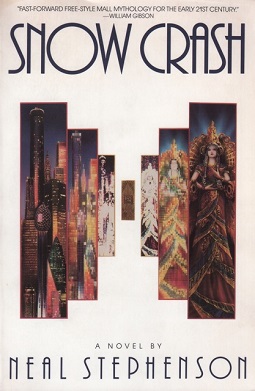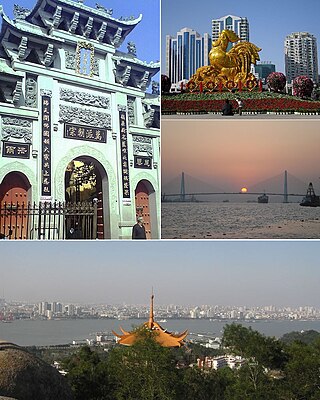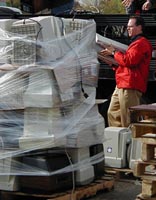
Apocalyptic and post-apocalyptic fiction is a subgenre of science fiction in which the Earth's civilization is collapsing or has collapsed. The apocalypse event may be climatic, such as runaway climate change; astronomical, such as an impact event; destructive, such as nuclear holocaust or resource depletion; medical, such as a pandemic, whether natural or human-caused; end time, such as the Last Judgment, Second Coming or Ragnarök; or any other scenario in which the outcome is apocalyptic, such as a zombie apocalypse, cybernetic revolt, technological singularity, dysgenics or alien invasion.

Snow Crash is a science fiction novel by the American writer Neal Stephenson, published in 1992. Like many of Stephenson's novels, its themes include history, linguistics, anthropology, archaeology, religion, computer science, politics, cryptography, memetics, and philosophy.

Shantou, alternately romanized as Swatow and sometimes known as Santow, is a prefecture-level city on the eastern coast of Guangdong, China, with a total population of 5,502,031 as of the 2020 census and an administrative area of 2,248.39 square kilometres (868.11 sq mi). However, its built-up area is much bigger with 12,543,024 inhabitants including Rongcheng and Jiedong districts, Jiexi county and Puning city in Jieyang plus all of Chaozhou city largely conurbated. This is de facto the 5th built-up area in mainland China between Hangzhou-Shaoxing, Xian-Xianyang and Tianjin.

Avian influenza, also known as avian flu or bird flu, is a disease caused by the influenza A virus (IAV) which primarily affects birds but can sometimes affect mammals including humans. Wild aquatic birds are the primary host of Influenza A virus (IAV), which is endemic in many bird populations.

Chenghai is a district of the city of Shantou, Guangdong Province, China.

Electronic waste recycling, electronics recycling, or e-waste recycling is the disassembly and separation of components and raw materials of waste electronics; when referring to specific types of e-waste, the terms like computer recycling or mobile phone recycling may be used. Like other waste streams, reuse, donation, and repair are common sustainable ways to dispose of IT waste.

Electronic waste describes discarded electrical or electronic devices. It is also commonly known as waste electrical and electronic equipment (WEEE) or end-of-life (EOL) electronics. Used electronics which are destined for refurbishment, reuse, resale, salvage recycling through material recovery, or disposal are also considered e-waste. Informal processing of e-waste in developing countries can lead to adverse human health effects and environmental pollution. The growing consumption of electronic goods due to the Digital Revolution and innovations in science and technology, such as bitcoin, has led to a global e-waste problem and hazard. The rapid exponential increase of e-waste is due to frequent new model releases and unnecessary purchases of electrical and electronic equipment (EEE), short innovation cycles and low recycling rates, and a drop in the average life span of computers.

Challenging the Chip is a 2006 book on "labor rights and environmental justice in the global electronics industry" edited by Ted Smith, David A. Sonnenfeld, and David Naguib Pellow. It is published by Temple University Press. In three parts, the book looks at global electronics, environmental justice and labor rights, and electronic waste and extended producer responsibility. In four appendices, the book also deals with the principles of environmental justice, the computer take-back campaign, sample shareholder resolutions, and the electronics recycler's pledge of true stewardship.
Guiyu is a town created from an agglomerate of four adjoined villages totalling 150,000 people in the Chaoyang district of Guangdong province in China. Situated on the South China Sea coast, Guiyu is perhaps best known in the global environmentalist community for its reception of e-waste. In fact, the town also holds the record for being the largest e-waste site of the world, as of 2013.

But n Ben A-Go-Go is a science fiction work by Scots writer Matthew Fitt, notable for being entirely in the Scots language. The novel was first published in 2000.
Guiyu, in Guangdong Province, China, is widely perceived as the largest electronic waste (e-waste) site in the world. In 2005, there were 60,000 e-waste workers in Guiyu who processed the more than 100 truckloads that were transported to the 52-square-kilometre area every day. The constant movement into and processing of e-wastes in the area leading to the harmful and toxic environment and living conditions, coupled with inadequate facilities, have led to the Guiyu town being nicknamed the "electronic graveyard of the world".

Electronic waste or e-waste in the United States refers to electronic products that have reached the end of their operable lives, and the United States is beginning to address its waste problems with regulations at a state and federal level. Used electronics are the quickest-growing source of waste and can have serious health impacts. The United States is the world leader in producing the most e-waste, followed closely by China; both countries domestically recycle and export e-waste. Only recently has the United States begun to make an effort to start regulating where e-waste goes and how it is disposed of. There is also an economic factor that has an effect on where and how e-waste is disposed of. Electronics are the primary users of precious and special metals, retrieving those metals from electronics can be viewed as important as raw metals may become more scarce
Electronic waste or e-waste in China refers to electronic products that are no longer usable and are therefore dumped or recycled. China is the world's largest importer and producer of electronic waste with over 70% of all global e-waste ending up in the world's largest dumpsites. An estimated 60–80% of this e-waste is handled through illegal informal recycling processes, without the necessary safety precautions legally required by Chinese government regulations. Processing e-waste in this way directly causes serious environmental damage and permanent health risks in areas surrounding the disposal sites. While the Chinese government and the international community have taken action to regulate e-waste management, ineffective enforcement, legislative loopholes, and the pervasiveness of informal recycling have been obstacles to mitigating the consequences of e-waste.
Chen Min is a Chinese famous writer, editor, commentator. He wrote under the pen name of Xiao Shu.

MBA Polymers is a recycling company with operations globally that recovers plastics from waste electrical and electronic equipment (WEEE) and auto-shredder residue from end-of-life automobiles (ELV).
The global waste trade is the international trade of waste between countries for further treatment, disposal, or recycling. Toxic or hazardous wastes are often imported by developing countries from developed countries.
Biological warfare (BW)—also known as bacteriological warfare, or germ warfare—has had a presence in popular culture for over 100 years. Public interest in it became intense during the Cold War, especially the 1960s and '70s, and continues unabated. This article comprises a list of popular culture works referencing BW or bioterrorism, but not those pertaining to natural, or unintentional, epidemics.

Chen Qiufan, also known as Stanley Chan, is a Chinese science fiction writer, columnist, and scriptwriter. His first novel was The Waste Tide (2013), which "combines realism with allegory to present the hybridity of humans and machines". Chen Qiufan's short fiction works have won three Galaxy Awards for Chinese Science Fiction and twelve Nebula Awards for Science Fiction and Fantasy in Chinese. "The Fish of Lijiang" received the Best Short Form Award for the 2012 Science Fiction & Fantasy Translation Awards. His stories have been published in Fantasy & Science Fiction, MIT Technology Review, Clarkesworld Magazine, Year's Best SF, Interzone, and Lightspeed, as well as influential Chinese science fiction magazine Science Fiction World. His works have been translated into German, French, Finnish, Korean, Czech, Italian, Japanese and Polish and other languages.
China's waste import ban, instated at the end of 2017, prevented foreign inflows of waste products. Starting in early 2018, the government of China, under Operation National Sword, banned the import of several types of waste, including plastics with a contamination level of above 0.05 percent. The ban has greatly affected recycling industries worldwide, as China had been the world's largest importer of waste plastics and processed hard-to-recycle plastics for other countries, especially in the West.

This article documents the chronology and epidemiology of SARS-CoV-2 in January 2020, the virus which causes the coronavirus disease 2019 (COVID-19) and is responsible for the COVID-19 pandemic. The first human cases of COVID-19 were identified in Wuhan, China, in December 2019.













